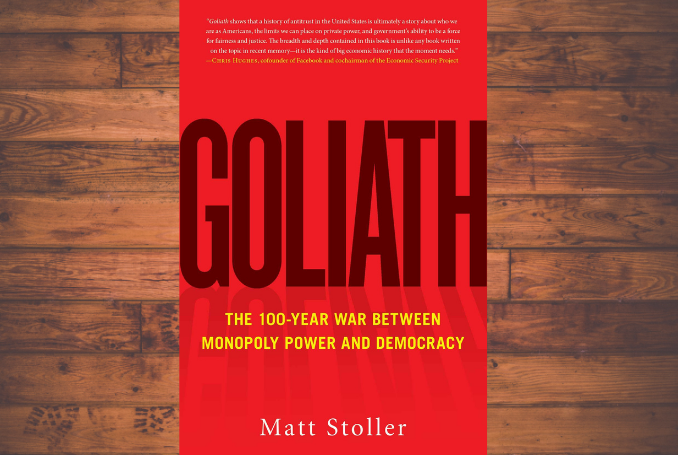
By Jim Miles
(Goliath: The 100-year War Between Monopoly Power and Democracy. Matt Stoler. Simon & Schuster, New York, 2019.)
Economic history is not a truly scintillating read. However, to understand how our society is arranged economically as it is today, “Goliath” provides an interesting background into the people, policies, and the political rhetoric (propaganda) that shaped the power struggle between monopoly power and democracy.
Without forcefully stating it, that is the theme of the book: monopoly power as it exists today with hugely wealthy corporations creating a non-democratic society. The historical journey in broad terms begins with the Roaring Twenties leading into the Great Depression; from there it is the story of Roosevelt’s New Deal and the ongoing attempts to do away with it, in particular after World War II. The oligarchy and monopolists won, as the Chicago School of economists “convinced not just the right wing but the left that antitrust, and more broadly democracy, as practiced in the middle of the twentieth century was not only inefficient, but countered the dictates of natural economic systems and science itself.”
Many familiar names face Stoller’s examination and critique. The presidents along the way all played their own important roles for setting the rhetoric if not the actual laws. Two of the perhaps better known names that are surprises are John Galbraith and Ralph Nader. Both were on the side of allowing monopolies: Galbraith believed the consumer would balance out the power of the monopolies and Nader was a free marketeer by way of the consumer being of prime importance, arguing that the lower the prices, the better for the consumer.
It is the less familiar names who play the main roles throughout the work, the economists, committee chairs and the backroom players who created both the laws and the rhetoric around the drive towards deregulation of corporations and banks. Most people aware of U.S. history are more than likely familiar with references to Andrew Mellon and J. P. Morgan, but personnel such as Louis Brandeis, Walter Wriston, Robert Jackson and Wright Patman do not account for much in general U.S. histories.
The Main Ideas
Within the New Deal were two main factors among many smaller acts that aided small entrepreneurs and protected them from monopolistic competition. Protection against predatory pricing or discounting allowed smaller merchants to market their products at their established price without being undercut – very frequently at a loss – by larger competition in order to keep them out of the market. Secondly, discrimination was not allowed, in other words large companies could not offer different prices in order to favour one entrepreneur over another in order to keep their monopolistic hierarchy in place.
The goal of the oligarchs – the system that Andrew Mellon reigned over – was threefold. First to rule an entire market with a specific corporate monopoly. Secondly was to turn each monopoly into a networked whole in order to “discipline wayward corporate structures.” The final piece was the rhetorical machinery, the “…set of intellectual concepts and political institutions that would protect financial empires from democratic influence…and to explain the world in ways that would organize citizens to seek not freedom from capital, but freedom for capital.”
…And the Winner is…
The winner is what we have today: a neoliberal economic order passed off as “science”, the latter derided throughout as the usage of invented mathematical formulas pretending to validate the neoliberal vision – “little [of the Chicago School] was ever rooted in empirical proof.” Protections for small entrepreneurs were gradually eliminated while deregulation for large corporations and banks allowed for predatory economic behaviour and the ongoing creation of a financialized economic system – one creating profits through a whole range of rentier actions where nothing is produced and profits are not used for development.
“Free trade” became a catchphrase, buy has nothing free about it. Money was free to travel, investments were free of legal constraints and the people, the “demos” became consumers. In the end the big guys became too big to fail and received bailouts everytime a financial problem hit them. The consumer, the little guy, received only more and more credit cards and usurious interest rates in order to keep the money flowing up rather than trickling down.
The Reagan Revolution was the consommation of many of the attempts to do away with the regulations of the New Deal. Credit cards, low bank rates for corporations, high rates for the consumer, mergers and buyouts, buying and discarding smaller corporations, huge concentrations of financial assets, stock buybacks to boost apparent value, outsourcing of employment, union busting all took flight during the 1970s and afterwards.
Today we are living with Facebook, Google, Microsoft, Apple, and Netflix, all huge corporations with immense wealth, gathering, distributing, and manipulating information. They and other large corporations are the organizers of our society, a society in which democracy is a year round theater of the absurd.
Solutions and Omissions
What we are left with are huge wealth and income inequities, a deregulated economic environment allowing huge powerful monopolies/oligarchs to essentially make the rules, and a mass of people not truly being able to practice democracy other than as an ongoing sham and pretence. Unfortunately Stoller’s conclusion – while being somewhat optimistic about America as a nation of trades people always rising to the challenge – does not offer any real solutions.
“Goliath” is focused on the fight between monopoly and democracy, but when it comes to solutions an accounting needs to be made in at least two other major areas, both related. The advent of the petrodollar and its requirement for control of oil transport and production ties into the huge debt trap created by its financial reserves status. It also ties into the enormous military budget and the militarized portions of the economy without which the U.S. would be producing even less statistically than it already does. And that ties farther into the global spread of U.S. military bases and its usage of covert and overt operations in order to sustain its beloved economic hegemony.
“Goliath” is a well written and well researched historical study. Economics is a dull study for most but this book creates an interesting and intriguing account of the mostly behind the scene activities and players for control of the country and the world.
– Jim Miles is a Canadian educator and a regular contributor/columnist of opinion pieces and book reviews to Palestine Chronicles. His interest in this topic stems originally from an environmental perspective, which encompasses the militarization and economic subjugation of the global community and its commodification by corporate governance and by the American government.

– Jim Miles is a Canadian educator and a regular contributor/columnist of opinion pieces and book reviews to Palestine Chronicles. His interest in this topic stems originally from an environmental perspective, which encompasses the militarization and economic subjugation of the global community and its commodification by corporate governance and by the American government.








